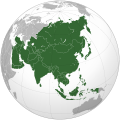
Afro-Asia is a term describing the combination of Africa and Asia. The term is often used to describe the solidarity between African and Asian nations when they were acting against European colonialism and later also remaining nonaligned during the Cold War. [1]
Contents
Together with Europe, Africa and Asia form the landmass of Afro-Eurasia.










